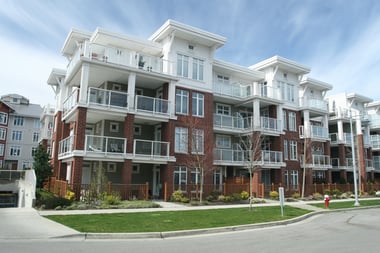
Property managers have quite the responsibility. They oversee hundreds even thousands of dwellings, occupied or not. Add occupants and that responsibility increases. The challenges faced daily are enough to make one’s head spin. The past year alone brought many new challenges with residents being more present on property, working remotely or having lost their job due to the business environment and COVID-19.
With all their responsibility, typically the top business challenges for property managers include: 1) tenant retention, 2) reputation, 3) risk management, 4) communications with tenants and potential tenants, and 5) improving efficiency. All of these areas are impacts by fire and life safety. Let’s take a closer look at how fire and life safety impacts these top challenges for property managers.
1. Tenant Retention
Every time a tenant leaves, there is a cost associated for the property manager. There are many reasons for a tenant to leave a dwelling, from personal and professional ones. There is nothing property managers can do to influence personal and professional motivations for leaving. However, they can influence the tenants’ satisfaction. And this begins with the way they manage their complaints and their safety.
Complaints come in all shapes and sizes, such as fire safety hazards, no visible fire extinguisher, lack of additional fire safety equipment – such as fire sprinklers – and more. While it is difficult to solve all issues, the way and speed with which complaints are handled have a great impact on tenant satisfaction and ultimately community reputation, which we’ll dive into deeper later. Tenants expect instant responses from their property managers for all inquiries, including fire and life safety.
It’s critical all fire and life safety equipment is in working order. If an incident were to take place that involved a broken piece of equipment, it can make tenants feel unsafe even if there are no injuries. This can influence tenants to leave and move to a new complex with better fire safety equipment. If a unit or building is seriously damaged, malfunctioning fire safety equipment will also cost the property manager space that could otherwise be earning them revenue through occupancy.
2. Reputation
This is an important facet when it comes to property management and apartments. People have a lot of choices today when choosing an apartment. Many lookt to online review sites to get a deeper picture into what’s really going on at the property, and people like to voice their thoughts especially when something bad goes wrong. Fire sprinkler systems not working correctly to douse a fire or outlet cords on the floor in the fitness room causing someone to fall and hurt themselves can prompt someone to leave a review online that damages the property managers reputation. Incidents like these can be a deterrent to new tenants and cause current tenants to leave, affecting retention for property management.
It’s so important to make sure your systems are up to code and that your fire safety vendor isn’t taking shortcuts. If they do take shortcuts, it leaves you vulnerable. A preferred fire and life safety company will make sure you are truly protected and can train your onsite staff on the basics of fire safety equipment so they know what to look for to alert them that service is needed for your systems.
Reputation management comes in all shapes, forms, and sizes. Don’t let a breakdown in the property’s fire safety systems cause negative reviews. They can do more damage than good.
3. Risk Management
Fire safety and risk management are always top of mind for property managers. There are numerous ways to mitigate fire risk. You want to ensure that your rental property is safe from all fire hazards so bring in a qualified fire safety expert to examine the property. Here’s a list of some of the more common fire safety tips property managers should consider:
-
Carrying out a fire risk assessment: Preventing fire hazards is the first step. Identifying the likely cause of a potential fire in the property can be done by a fire risk assessment. This will ultimately help you create a fire prevention strategy. According to an NFPA report, smoking, electrical, open space heating, balcony grills, and candles are some of the significant causes of a rental property fires.
-
Ensure smoke detectors and alarm are installed. This goes without saying, but residences need smoke alarms. Smoke detectors can easily detect smoke far faster than you or your tenants can. Double check to make sure they are everywhere and that they are in working order.
-
Go the extra mile with additional fire safety equipment. While installing smoke detectors is a great step, go the extra distance by having fire alarm systems with monitoring, fire extinguishers in all units as well as on each floor (sometimes multiple extinguishers on floors), and fire sprinkler systems installed throughout the property. All these fire safety systems will help prevent damage. Fire extinguishers and sprinklers can help stop or slow the fire from spreading while fire alarms with monitoring can alert both nearby tenants to get out and alert first responders to rush to the scene.
-
Consider a no smoking policy. According to the NFPA, smoking is one of the leading causes of home fire deaths. Many property management companies are adopting a no smoking policy in lease agreements. As a property manager, you can restrict smoking within apartments, common areas, etc.
-
Create an evacuation plan and educate tenants. Identify all possible evacuation exits. Draw up a clear evacuation map that highlights the relevant escape routes depending on where people are located within the property. By creating a plan, you will be able to educate current and new tenants. If you have multiple buildings, be sure there are dedicated routes in each building and property emergency lighting on all floors.
-
Maintain regular maintenance. By working with an experienced fire and life safety company, you will ensure your property’s fire safety systems are compliant with all local, state, and government codes and standards. They will also keep your property updated on inspections and any required maintenance timelines.
4. Communications with Tenants and Potential Tenants
What do tenants and potential tenants have in common? They both expect instant communication with property managers when questions arise, updates occur, or new protocols are in place. Property managers have everything to gain from improving their communications with tenants. Overall, happy tenants stay longer but also attract more of the same types of tenants. Beyond the obvious benefits of retaining tenants, better communication also simplifies answering complaints and requests for repair, making it easier to maintain properties and keep up on preventative maintenance.
Poor communication turns off tenants and potential tenants. When your tenants or potential tenants spend a long time on hold on the phone or don’t get an email response for days, they become unhappy and can be motivated to leave negative reviews online, damaging your reputation. Better communication with them will make them happier and increase their customer satisfaction, and they may even be motivated to leave a positive review about their great experience. This may contribute to attracting more tenant leads and renewals.
Communication is especially important when it comes to fire and life safety. Always make sure to inform tenants and potential tenants who are visiting of when a fire safety inspection is going to occur. Nobody wants to be surprised when your fire alarm system starts blaring unexpectedly or the fire marshal shows up needing to enter the premises. Communicate proactively to tenants so you can set expectations for them and give them time to prepare.
By fostering consistent communication with tenants, property managers ensure higher retention rates and a better sense of community. While it may be impossible to foresee an emergency, keeping tenants informed is easy. This quality communication adds transparency to the relationship, improves tenant engagement, and builds stronger relationships with residents.
5. Improving Efficiency
Maintaining ideal customer service levels and tenant satisfaction may be challenging if you’re seeing ramifications from the other pain points we discussed. If efficiency is poor throughout several aspects of property, there’s usually an underlying issue.
Take for instance, the property maintenance manager is consistently being pulled away from other duties to fix malfunctioning sprinkler heads or fire alarms or smoke detectors that are going off when there is no fire. This delays the manager’s ability to address other maintenance issues. If you are having a consistent problem with your fire safety systems, it’s probably time to consult a fire and life safety company so you can uncover and fix the underlying problem.
A preferred fire and life safety company will ensure the property life safety systems are all maintained, managed, and inspected. They will be proactive in notifying the property with upcoming service reminders. They will also have a comprehensive device management platform to manage your systems and alert you when there is a maintenance issue.
Enabling the staff with tools that will simplify their work, safeguard their time, and make their daily routine tasks more efficient is the big picture here. It’s critical to have the necessary platforms in place that enable the staff to provide the best customer service to the tenants.
Working in property management can be a challenge, but there are so many ways to get ahead of the challenges to prevent them. Particularly when it comes to fire and life safety. Remember best practices and always work with professionally trained fire and life safety experts who can ensure your property is compliant and your tenants can rest easy knowing they are safe and secure.




